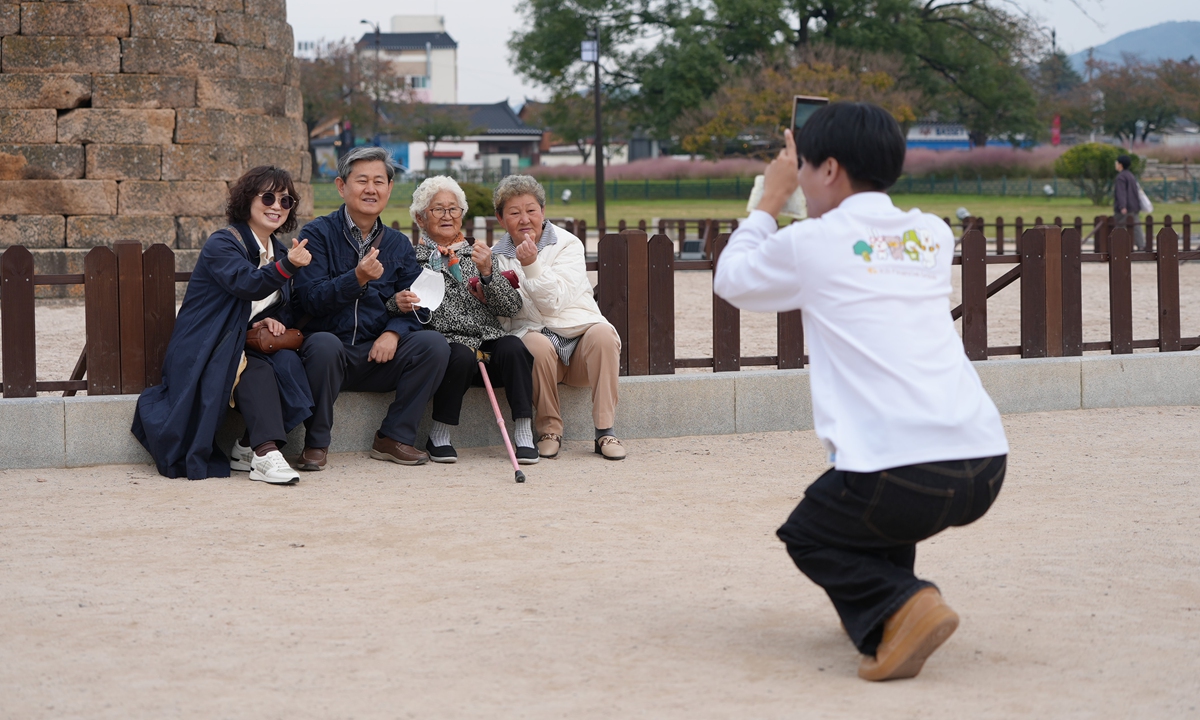
A volunteer assists local residents with taking photos during the 2025 APEC Economic Leaders’ Meeting. Photo: Zou Zhidong/GT
Chinese President Xi Jinping said in Gyeongju, South Korea, on Saturday that the Chinese city of Shenzhen in South China’s Guangdong Province will host the Asia-Pacific Economic Cooperation (APEC) Economic Leaders’ Meeting in November 2026, while attending the APEC chairmanship handover session of the 32nd APEC Economic Leaders’ Meeting, the Xinhua News Agency reported. People from various sectors in South Korea told the Global Times that as an important member of APEC, China has long injected momentum into regional economic integration. They said Shenzhen, a key window of China’s reform and opening-up, impresses the world with its innovation and vitality, and they look forward to next year’s APEC meeting in China.
Kim Kyoung-dae, president of the Ulsan branch of the Korea China Economy & Culture Education Association (KCCEA), who frequently travels between the two countries for work, told the Global Times that he still remembers his first visit to China in 2004, when China was known as the “world’s factory.” But now, he said, China has achieved all-round development across the economy, technology, culture, environment, and society, becoming a key engine of global innovation. In particular, over the past decade, China has made remarkable progress in green energy, electric vehicles, artificial intelligence, and the digital economy.
Shenzhen’s vitality and innovation are remarkable, Kim said, adding that these changes show that China is no longer just a manufacturing base, but a partner capable of proposing new values and visions. On the international stage, China continues to champion peace and cooperation in the region and is committed to addressing the common challenges facing humanity, demonstrating the wisdom and responsibility of a major country.
“From Gyeongju in 2025 to Shenzhen in 2026, it shows that South Korea and China can jointly chart the future development vision of Asia,” Kim told the Global Times. “As an important APEC member, China has long driven regional economic integration. I believe the 2026 APEC meeting in China will be a vital opportunity for the Asia-Pacific region to build a new cooperative order – something I look forward to very much.”
“What impressed me most about China is that technology changes life,” said South Korean vlogger Jin Yeong-eun, who came from Gyeongju to China. “When I came to China as an exchange student in 2017, I was amazed by how convenient mobile payments and high-speed rail were. Now, they’re simply part of daily life – you don’t need a wallet to go out, and traveling by train or bus is so easy. This progress gives China real confidence when talking about the digital economy or mobile payments internationally – it’s not just about the future, it’s the life people are already living.”
“I started learning Chinese in 2014, came to Shanghai [in East China] and Zhuhai [in South China’s Guangdong Province] as an exchange student in 2017, and now I’ve settled down in Yichang [Central China’s Hubei Province]. I’ve witnessed China’s achievements under the Belt and Road Initiative (BRI) and how it’s building closer ties with other Asia-Pacific economies.” Jin added, “I sincerely hope the 2026 APEC meeting in China will help the world better appreciate the unique charm of Asia-Pacific economies.”
South Korean business advisor Lee Byung-hun told the Global Times that APEC, as one of the most important economic cooperation platforms in the Asia-Pacific, has long played a key role in promoting regional trade liberalization and connectivity. “China has actively advanced regional economic integration with an open and inclusive attitude. I hope China will continue to lead and inject more stability and growth into the region,” Lee said.
China has successfully hosted APEC meetings twice – in 2001 and 2014. Lee noted that over the past two decades, China has transformed rapidly and, through the BRI, has established a global presence and significantly enhanced its international standing. He said China’s role in promoting regional cooperation and global governance has become increasingly vital. “The 2026 APEC meeting in Shenzhen will not only showcase the achievements of Chinese modernization,” he added, “but also mark a new starting point for deepening Asia-Pacific connectivity and consensus.”
In Gyeongju, Global Times reporters met young volunteers from around the world. Kaori Leydi Choque Pichihua, a Peruvian student in South Korea, said she felt honored to volunteer at this year’s APEC meeting. “Last year, APEC was held in my hometown in Peru, and now I’m in South Korea continuing that experience,” she said. “Thanks to China’s visa-free policy for Peru, I recently visited Beijing, Guangzhou, and Hong Kong. I loved China and hope to volunteer again at next year’s APEC meeting in Shenzhen.”
Another Japanese volunteer, Masato Takamori, told the Global Times that although he has never been to China, he is very interested in Shenzhen. It’s a city full of technological vitality, he said, adding that he hopes to volunteer next year, learn more about Chinese society and culture, and help build bridges between young people in Japan and China.
Global Times reporters learned that the youth volunteers at the APEC meeting in Gyeongju came from China, Japan, South Korea, Vietnam, Peru, and other countries. They said they had become friends, studying and growing together – “just like APEC members.”
Park Seung Chan, chairman of the Federation of Korea-China and Professor at Yongin University, told the Global Times that as two major economies in the Asia-Pacific, China and South Korea can play a leading role in safeguarding the multilateral trading system.
Through this year’s APEC meeting in Gyeongju and next year’s in Shenzhen, the two countries can strengthen coordination, work with other members to consolidate free trade, and jointly oppose unilateralism and protectionism. This not only serves both countries’ common interests but also contributes to the stability and development of multilateral cooperation across the Asia-Pacific and the world, Park said.
